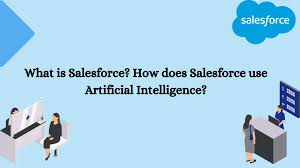With all the buzz in the news about AI, it may feel like AI is everywhere. In fact, as of 2023, over 80% of global companies report adopting AI to enhance their business operations. This means if your company isn’t yet leveraging AI to strengthen customer relationships, you risk falling behind. The good news is that Salesforce CRM already comes with a suite of AI tools ready for use. In this insight, we’ll explore how combining quality data, AI, and Salesforce can help you build more meaningful, lasting relationships with your customers.
How Does Salesforce Use AI?
Salesforce offers various built-in functionalities to create customizable, predictive, and generative AI experiences tailored to your business needs. One standout tool is Agentforce, which enables the creation of autonomous AI agents. If you have numerous routine tasks but limited staff, Agentforce could be the solution. For instance, if you lack an in-house customer support agent, Agentforce can build an AI service agent to handle incoming cases, responding intuitively in real-time. Not enough sales reps? No problem—create an AI sales agent to manage records, interact with leads, answer questions, and schedule meetings.
Another significant AI feature is generative AI in Salesforce. According to KPMG, 77% of executives believe generative AI will have a more profound societal impact in the next three to five years than any other emerging technology. So, how can it improve your business? Salesforce’s in-house LLM, xGen, helps you generate human-like text and create original visual content from existing data or user input. This capability can enhance user experiences by automating the generation of dynamic and personalized imagery for applications.
Generative AI also transforms how users interact with and consume data. Complex datasets can now be converted into easily understandable formats—visualizations, charts, or graphs—generated from natural language prompts. These insights make data accessible, enabling users to share knowledge and drive informed decisions.
How Can You Use AI to Improve Customer Relationships?
AI is reshaping business models, workflows, and customer engagement. By harnessing quality data, AI, and Salesforce, you can enhance how you connect with customers. Here are key ways to leverage this combination for a smarter customer strategy:
- Deliver the “Wow” Factor: Salesforce AI helps analyze vast customer data, uncover individual preferences, and deliver personalized experiences at scale. With Data Cloud, Salesforce consolidates customer data across applications like Sales, Marketing, and Service Clouds, merging profiles into a single view. This holistic insight allows for personalized interactions that truly engage customers.
- Make Customer-Centric Decisions: While businesses often use data to monitor overall performance, Salesforce AI helps focus on individual customer relationships. For example, when a customer contacts support with an issue, AI can analyze conversation transcripts in real time, providing resources to resolve the problem. Tools like Tableau visualize satisfaction rates and other metrics, empowering you to make personalized, data-driven decisions to improve customer experience.
- Streamline Sales Workflows: AI can automate repetitive tasks, such as data entry, appointment scheduling, and report generation, freeing up your sales reps to focus on more value-driven activities. Instead of switching between multiple applications or manually managing processes, AI ensures that no customer interactions fall through the cracks.
Challenges You May Encounter on Your AI Journey
Adopting AI in Salesforce, especially Einstein AI, offers many benefits, but it also comes with challenges. Here are some factors to consider for a successful rollout:
- Data Readiness: AI tools require clean, structured, and up-to-date data to deliver accurate insights. Ensuring your data is of high quality is crucial for effective AI implementation.
- User Training: Teams must be trained to use AI-driven insights confidently. Comprehensive training ensures seamless adoption and integration into daily workflows.
- Change Management: AI adoption may require a cultural shift. Establishing a clear change management strategy is essential for organizational alignment.
- Continuous Learning: AI technologies are always evolving. Businesses need to stay updated on the latest features to maximize the value of their AI investments.
Importance of Data Quality When Using AI Analytics
Data quality is essential for AI accuracy and reliability. Poor data can skew predictions and erode user trust. Key factors that contribute to high data quality include:
- Accuracy: Data should reflect real-world events or objects accurately.
- Duplicate Data: Duplicates distort analysis and inflate results, such as sales forecasts.
- Consistency: All users should access the same version of data to avoid conflicts.
- Completeness: Ensure no data gaps that could affect outcomes.
- Timeliness: Fresh data is crucial for relevant AI outputs.
- Relevance: Only data that fits your specific needs should be used to inform decision-making.
AI can also enhance data quality by automating data validation and cleansing. Machine learning algorithms can detect and address anomalies, duplicate records, and incomplete datasets, improving the reliability of your data over time.
The Future of CRM: AI-Driven Customer Engagement and Business Growth
Integrating AI into Salesforce is revolutionizing CRM by enabling businesses to engage with customers more intelligently. From automating routine tasks to enhancing decision-making and delivering personalized communication, AI-driven innovations are empowering businesses to build stronger relationships with customers. As AI continues to evolve, those who embrace it will gain a competitive edge and drive long-term growth. The future of CRM is here—and it’s smarter, faster, and more customer-focused than ever.













